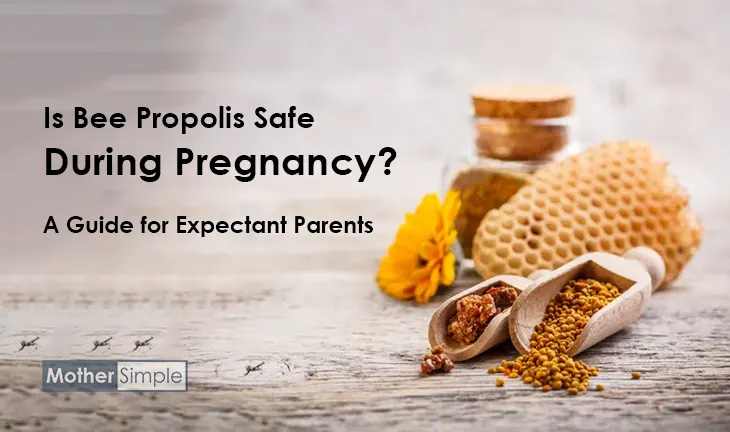Based on the available scientific research and current medical knowledge, it is not possible to provide a definitive “yes” or “no” answer to whether bee propolis is safe during pregnancy. As mentioned, there is limited research specifically addressing its safety in pregnancy. Therefore, it is generally recommended to err on the side of caution and avoid using bee propolis or any other herbal or dietary supplements during pregnancy unless specifically prescribed or recommended by your healthcare provider. Consulting with your healthcare provider will ensure that you receive personalized advice based on your circumstances.
Bee propolis is a resinous substance that bees collect from tree buds and other botanical sources. It is commonly used in traditional medicine for various purposes, such as its potential antibacterial, antifungal, and anti-inflammatory properties. However, there is limited scientific research specifically addressing the safety of bee propolis during pregnancy.
Due to the lack of conclusive evidence on its safety during pregnancy, it is generally recommended to err on the side of caution and avoid using bee propolis or any other herbal or dietary supplements during pregnancy unless specifically prescribed or recommended by your healthcare provider.
During pregnancy, it is crucial to prioritize the health and well-being of both the mother and the developing baby. Certain substances, including natural products like bee propolis, may have unknown effects on pregnancy outcomes or potential interactions with medications or medical conditions. Therefore, it is essential to consult with your healthcare provider before using any herbal or dietary supplements during pregnancy.
Your healthcare provider will have a comprehensive understanding of your medical history, current health status, and any specific concerns related to your pregnancy. They will be able to provide you with personalized advice and guidance based on your circumstances.
Remember, when it comes to pregnancy and medication/supplement use, it is always best to consult with a qualified healthcare professional to ensure the safety and well-being of both the mother and the baby.
As an expectant parent, ensuring the safety of both you and your growing baby is of utmost importance. One question that often arises is whether bee propolis, a natural resinous substance collected by bees, is safe to use during pregnancy. In this comprehensive guide, we’ll delve into the topic and provide you with the information you need to make an informed decision.
Understanding Bee Propolis
1. What is Bee Propolis?
Bee propolis is a sticky substance made by bees using resins they gather from tree buds and other botanical sources. They mix these resins with beeswax and enzymes to create propolis, which they use to seal and protect their hives from external threats.
2. Composition and How Bees Collect It
Bee propolis is composed of various compounds, including resins, waxes, essential oils, and pollen. Bees collect these substances from plants and process them in their bodies to produce propolis. The resulting composition can vary depending on the geographical location and plant sources available to the bees.
3. Historical Use and Cultural Significance
Bee propolis has a rich history of use in traditional medicine, dating back centuries. Many cultures around the world have valued its potential medicinal properties, utilizing it for its reputed antibacterial, antifungal, and anti-inflammatory effects.
Safety Concerns During Pregnancy
1. Unique Considerations During Pregnancy
Pregnancy brings unique considerations when it comes to using any supplements, including natural ones. The developing baby is highly sensitive, and any substance introduced into the body may potentially have an impact. It’s crucial to approach any supplementation during pregnancy with caution and seek guidance from your healthcare provider.
2. Potential Risks Associated with Herbal Supplements
Herbal supplements, including bee propolis, may carry potential risks during pregnancy due to limited scientific research and unknown interactions with pregnancy hormones and the developing baby. The lack of conclusive evidence emphasizes the need for careful evaluation and discussion with a healthcare professional.
3. Importance of Consulting Healthcare Providers
When it comes to your health and the health of your baby, it’s essential to consult with your healthcare provider before using any supplements, including bee propolis. Your healthcare provider has a comprehensive understanding of your medical history, any existing conditions, and potential risks, allowing them to provide personalized guidance and recommendations.
Research on Bee Propolis and Pregnancy
1. Overview of Available Scientific Studies
While there is limited specific research on bee propolis and pregnancy, some studies have explored its potential benefits and safety profile. However, these studies are not sufficient to draw definitive conclusions regarding its safety during pregnancy.
2. Limitations and Gaps in Research
The lack of comprehensive research on bee propolis during pregnancy highlights the need for more extensive studies to better understand its potential effects and safety profile. Without robust scientific evidence, it is challenging to ascertain its safety and potential benefits during this crucial time.
3. Need for Caution and Further Investigation
Due to the limited research available, it is prudent to exercise caution and avoid using bee propolis or any other herbal supplements during pregnancy unless specifically prescribed or recommended by your healthcare provider. Further investigation is necessary to fill the gaps in knowledge and provide more accurate guidance.
Potential Benefits of Bee Propolis
1. Antibacterial and Antifungal Properties
Bee propolis has been associated with potential antibacterial and antifungal properties, which may support the body’s natural defense mechanisms. However, it’s important to note that the extent of these effects and their specific impact during pregnancy require further scientific investigation.
2. Anti-inflammatory Effects
Inflammation is a natural response in the body, but excessive inflammation can
cause harm. Some studies suggest that bee propolis may possess anti-inflammatory properties, which could have potential benefits. However, more research is needed to understand its effects specifically during pregnancy.
3. Immune System Support
Bee propolis is believed to support immune system function due to its various bioactive compounds. While this potential benefit is promising, its specific impact during pregnancy remains uncertain, emphasizing the need for more comprehensive scientific studies.
Safety Precautions and Recommendations
1. Importance of Informed Decision-Making
During pregnancy, it is crucial to make informed decisions regarding any supplements or medications. This includes carefully evaluating the potential risks and benefits of using bee propolis and considering alternative options that are supported by stronger scientific evidence.
2. Consulting Healthcare Provider Before Use
To ensure the well-being of both you and your baby, it is vital to consult with your healthcare provider before using bee propolis or any other herbal supplements. Your healthcare provider can provide personalized advice based on your circumstances, helping you make the best decision for your pregnancy.
3. Considerations for Allergies and Sensitivities
If you have known allergies or sensitivities to bee products, including propolis, it is advisable to avoid using it during pregnancy. Allergic reactions can be unpredictable and potentially harmful to both you and your baby.
4. Monitoring for Adverse Reactions
If you decide to use bee propolis during pregnancy under the guidance of your healthcare provider, it is essential to monitor for any adverse reactions. Pay attention to any changes in your well-being and inform your healthcare provider immediately if you experience any concerning symptoms.
Alternative Remedies and Practices
1. Discussing Alternative Options with Healthcare Provider
If you are seeking natural remedies during pregnancy, it is important to have an open conversation with your healthcare provider. They can guide you towards alternative options that have a stronger safety profile and are supported by more extensive scientific research.
2. Natural Remedies Suitable for Pregnant Women
Numerous natural remedies can be safe and beneficial during pregnancy, such as proper nutrition, regular exercise, adequate rest, and stress management techniques. Your healthcare provider can help you explore these options in more detail.
3. Examples of Safe Alternatives to Bee Propolis
For specific health concerns during pregnancy, your healthcare provider may recommend safe alternatives to bee propolis. These alternatives can provide similar benefits without the potential risks associated with using herbal supplements during this critical time.
Other Considerations
1. Quality and Sourcing of Bee Propolis Products
If you decide to use bee propolis under the guidance of your healthcare provider, it is important to ensure the quality and sourcing of the products you choose. Look for reputable brands that prioritize quality control and transparency in their manufacturing processes.
2. Potential Interactions with Medications
It’s crucial to consider potential interactions between bee propolis and any medications you may be taking during pregnancy. Herbal supplements, including bee propolis, can interact with certain medications, potentially affecting their efficacy or safety. Always inform your healthcare provider about any supplements you are using.
3. Personalized Advice for Individual Cases
Every pregnancy is unique, and what may be appropriate for one expectant parent may not be suitable for another. That’s why it is vital to consult with your healthcare provider who can provide personalized advice and recommendations based on your individual health status, medical history, and pregnancy needs.
Conclusion
In conclusion, the safety of bee propolis during pregnancy remains uncertain due to limited scientific research. While it holds potential benefits, it is important to prioritize caution and consult with your healthcare provider before using any herbal supplements during pregnancy. Your healthcare provider’s guidance will help you navigate the complexities of pregnancy and make the best decisions to ensure the health and well-being of both you and your baby.
Additional Resources
Here are some useful sources you can refer to for additional information on the safety of bee propolis during pregnancy:
- American Academy of Family Physicians (AAFP): Visit the AAFP website at www.aafp.org for evidence-based articles and guidelines on pregnancy and herbal supplement safety. They provide reliable information for healthcare professionals and patients alike.
- American College of Obstetricians and Gynecologists (ACOG): ACOG offers valuable resources on pregnancy-related topics. Their website, www.acog.org, includes guidelines and patient education materials that address herbal supplement use during pregnancy.
- National Institutes of Health (NIH): The NIH website, www.nih.gov, provides access to a wide range of research articles, studies, and clinical trials. Searching for “bee propolis and pregnancy” on their database, PubMed (www.ncbi.nlm.nih.gov/pubmed), can provide reliable scientific publications.
- Center for Drug Evaluation and Research (CDER): The CDER, part of the U.S. Food and Drug Administration (FDA), offers regulatory information and resources on medications and supplements. Visit their website at www.fda.gov/drugs for insights on the safety and regulation of herbal products.
- March of Dimes: As a trusted nonprofit organization dedicated to maternal and infant health, March of Dimes provides evidence-based information for expectant parents. Their website, www.marchofdimes.org, includes resources on pregnancy, including safety considerations for supplements.
Remember to always critically evaluate the information from external sources and consult with your healthcare provider for personalized advice based on your individual circumstances.
FAQs: Is Bee Propolis Safe During Pregnancy? A Guide for Expectant Parents
1: What is bee propolis and how is it collected?
Bee propolis is a resinous substance made by bees using resins they gather from tree buds and other botanical sources. Bees mix these resins with beeswax and enzymes to create propolis, which they use to seal and protect their hives from external threats.
2: Are there any potential risks associated with using bee propolis during pregnancy?
Using bee propolis or any herbal supplements during pregnancy carries potential risks due to limited scientific research and unknown interactions with pregnancy hormones and the developing baby. It is important to consult with your healthcare provider before using bee propolis or any other supplements.
3: Is there scientific research available on bee propolis and pregnancy?
While there is limited specific research on bee propolis and pregnancy, some studies have explored its potential benefits and safety profile. However, more comprehensive studies are needed to draw definitive conclusions.
4: What are the potential benefits of bee propolis?
Bee propolis has been associated with potential antibacterial and antifungal properties, anti-inflammatory effects, and immune system support. However, it’s important to note that the extent of these effects during pregnancy requires further scientific investigation.
5: What precautions should I take when considering bee propolis during pregnancy?
It is important to make informed decisions by consulting your healthcare provider before using bee propolis or any herbal supplements during pregnancy. They can provide personalized guidance based on your circumstances and help you understand the potential risks and benefits.
6: Are there safe alternatives to bee propolis during pregnancy?
Yes, some alternative remedies and practices can be safe and beneficial during pregnancy. It is recommended to discuss these options with your healthcare provider, who can guide you toward alternatives that have a stronger safety profile and are supported by more extensive scientific research.
7: How can I ensure the quality and safety of bee propolis products?
To ensure the quality and safety of bee propolis products, look for reputable brands that prioritize quality control and transparency in their manufacturing processes. It is also important to discuss the sourcing and quality of the product with your healthcare provider.
8: Can bee propolis interact with medications during pregnancy?
Yes, herbal supplements, including bee propolis, can potentially interact with medications. It is important to inform your healthcare provider about any supplements you are using to avoid potential interactions that may affect the efficacy or safety of your medications.
9: Why is it crucial to consult with a healthcare provider during pregnancy?
Consulting with a healthcare provider is crucial during pregnancy as they have a comprehensive understanding of your medical history, any existing conditions, and potential risks. They can provide personalized advice and recommendations to ensure the health and well-being of both you and your baby.
10: What is the key takeaway regarding bee propolis and pregnancy?
The key takeaway is to prioritize caution and consult with your healthcare provider before using bee propolis or any herbal supplements during pregnancy. Their guidance will help you make informed decisions that prioritize the health and well-being of both you and your baby.













